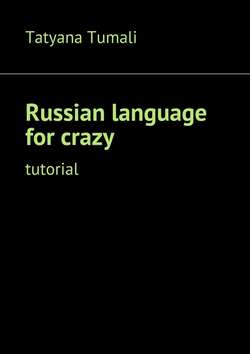Читать книгу Russian language for crazy. Tutorial - Tatyana Yakovlevna Tumali - Страница 13
The Present Tense
ОглавлениеThe Correlation between Tense and Verbal Aspect
As you already understood, at formation of the Past Tense in Russian 2 verbal aspects and suffix-Л are used. What is the correlation between an aspect of a verb and the formation of the Present and the Future Tenses? We’ll talk about this later, but now let’s talk on another point for the beginning. All verbs in Russian in the Present Tense and the Future Tense change their endings depending on pronouns. For example, the verb “знать”. Depending on a pronoun the verb will change: Я знаю. Мы знаем. Ты знаешь. Вы знаете. Он, она знает. Они знают. Another example. Работать – (н.в.). Я работаю. Мы работаем. Ты работаешь. Вы работаете. Он, она работает. Они работают.
And all these changing forms need to learn! (Do you still want to learn Russian? -)). It’s wrong to say: Я работать. Or: Я работаем. When “я”, so, it’s correct to say: Я работаЮ.
The verb “знать” is of imperfective aspect. This means that the phrase “Я знаю” refers to the Present Tense. Why? The fact is that the Present Tense of verbs in Russian is formed from the verbs of imperfective aspect only! Thus, when you want to say about what you’re doing now or about repeated action, you use the verbs of imperfective aspect. To the question “Что ты сейчас делаешь?”, you can answer, for example, Я читаю. (читать – н.в.). Я сплю. (спать – н.в.). Я работаю. (работать – н.в.).
One more example. Я покупаю продукты. (покупать – н.в.). Compare, for example, with the phrase “Я куплю (купить – с.в.) продукты”. The verbs купить-покупать have one and the same meaning and differ in aspects only. While in the first sentence, we are talking about an event that occurs at the present moment (for example, you are in a store and talk on the phone) or about repeated event. The verb “покупать” is of imperfective aspect, it refers to the present tense. The verb “купить” is of perfective aspect, therefore, all forms formed from it, refer to the future tense. For example, when Russian says: “Я куплю машину”, the Future Tense is meant. (You’ll read more about the Future Tense in the next chapter). An example of repeated action, when the verbs of imperfective aspects are used and which refer to the Present Tense, are the following sentences: “Я езжу (ездить – н.в.) на работу на автобусе”. (“I go (to go – imperf.) to work by bus”. ) “Летом часто идут (идти – н.в.) дожди”. (“It rains (to rain – imperf.) often in summer”), « Я часто звоню (звонить – н.в.) домой”. (” I often call (to call – imperf.) home”. ) In table 1 you can see all endings of verbs. Pay your attention, that endings of verbs are different. For example, Он учится (н.в.) – the ending is – ИТ. Он работает (н.в.) – the ending is – ЕТ. The choice between —ит or —ет depends on conjugation (the 1st conjugation predetermines the verb’s ending —ЕТ, the 2nd conjugation predetermines -ИТ). Your brain might blow up from the amount of information that you need to remember. Therefore, in order to make this task easier, at the initial stage the verbs will be given in finished form. The main thing is to change the ending of a verb in relation to pronoun or noun.
